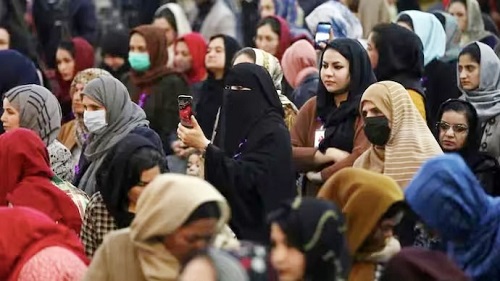
Formal complaint to UNHRC alleges violation of women’s rights by Sharia
By Hement Patel
Rarely do formal complaints make their way to the UN Human Rights Council (UNHRC) regarding the infringement of women’s human rights stemming from Sharia law. However, human rights activist Deepti Mahajan, leading the Coalition CHINGARI, spearheaded a petition signed by 80 individuals from diverse countries, including the US, Canada, Israel, India, the UK, Austria, Australia, Netherlands, Russia, and South Africa, addressed to the UNHRC.
The Coalition CHINGARI is dedicated to advocating for Hindu girls and raising awareness about their plight, particularly regarding abduction and forced conversion in Pakistan—an issue extensively covered by Jihad Watch over the years. Despite heightened awareness and protests, the grim reality persists, with an estimated 1,000 Hindu and Christian girls forcibly converted to Islam annually.
Mahajan underscored the broad spectrum of signatories, encompassing Muslims, ex-Muslims, victims of Sharia, intellectuals, professors, journalists, and professionals. The petition’s timing, coinciding with International Women’s Day, underscores the urgent need to address the systemic violations of women’s rights perpetuated by Sharia.
The complaint meticulously outlines the entrenched pattern of gross violations of women’s human rights perpetuated by Sharia law. It highlights the fundamental incongruence between Sharia and international human rights law, particularly citing the Convention on the Elimination of All Forms of Discrimination against Women (CEDAW). Drawing on an array of evidence, including UN documents and firsthand testimonies from women impacted by Sharia, the complaint paints a vivid picture of the stark reality.
The complaint delineates three principal areas of concern: violence against women, Sharia law, and cultural norms within Islam. It sheds light on the widespread instances of Sharia-linked violence against women globally, ranging from sexual violence and slavery to forced marriages and discriminatory practices entrenched in Islamic culture.
Moreover, the complaint delves into statistical analyses, revealing the inherent gender inequalities embedded in Quranic verses and Hadiths. It exposes the adverse effects of Islamic cultural norms on women’s rights, such as Female Genital Mutilation (FGM) and barriers to education and sports participation for Muslim women.
In a call to action, the complainants urge the UNHRC to take concrete steps, including soliciting a comprehensive response from the Organization of Islamic Cooperation (OIC) regarding the compatibility of Sharia with women’s human rights. They advocate for the appointment of non-Muslim rapporteurs to investigate discriminatory practices and collaborate with UN Women to address the root causes of gender inequality perpetuated by Sharia.
The complaint resonates as a clarion call for global solidarity and concerted action to confront the ongoing violations of women’s rights sanctioned by Sharia law. It implores international bodies to uphold their commitment to promoting and safeguarding human rights universally, with a steadfast focus on gender equality and women’s empowerment.
Disclaimer: The views and opinions expressed in this article are those of the author and do not necessarily reflect the views or ideologies of the publisher, editor of this paper.